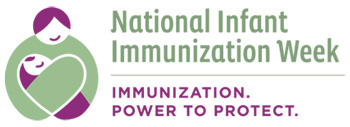It's a New Day in Public Health.
The Florida Department of Health works to protect, promote, and improve the health of all people in Florida through integrated state, county, and community efforts.
Be Wise—Immunize
April 23, 2013

Want to know more about infant immunizations? It’s National Infant Immunization Week, so with a little help from the Centers for Disease Control and Prevention, DOH is answering your top questions. For more information on tracking infant immunizations, visit Florida SHOTS at www.flshots.com.
Q: Why do babies need immunizations?
A: Immunizations help prevent the spread of disease and protect infants and toddlers against dangerous complications. Each day, nearly 12,000 babies are born in the United States who will need to be immunized before age two against 14 vaccine-preventable diseases.
Q: What is the benefit of infant immunization?
A: Vaccines reduce the risk of infection by working with the body’s natural defenses to help it safely develop immunity to disease.
When germs, such as bacteria or viruses, invade the body, they attack and multiply. This invasion is called an infection, and the infection is what causes illness. The immune system then has to fight the infection. Once it fights off the infection, the body is left with a supply of cells that help recognize and fight that disease in the future.
Vaccines help develop immunity by imitating an infection, but this “imitation” infection does not cause illness.
Q: What immunizations does my child need?
A: Always talk to your health care provider before getting your child immunized. For a list of child immunizations and related schedules, visit the Department's Immunization Program—Children and Adolescents page.
Q: As a parent, how do I know if immunizations are safe for my infant? What is the risk?
According to the CDC, the risk or likelihood that a vaccine will seriously harm a child is extremely small. Vaccines are held to the highest standard of safety by CDC and the U.S. Food and Drug Administration—both are federally mandated to monitor the safety of vaccines. The United States currently has the safest, most effective vaccine supply in history. Years of testing are required by law before a vaccine can be licensed. Once in use, vaccines are continually monitored for safety and effectiveness.
For a summary of risks associated with a particular vaccine, you can read the Vaccine Information Statement for that vaccine.




Connect with DOH